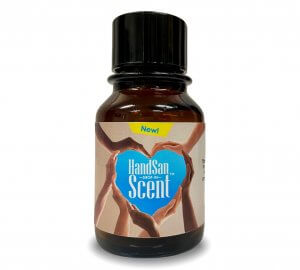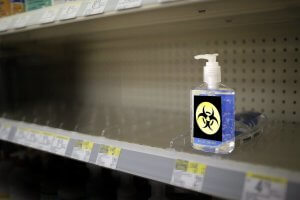The coronavirus outbreak that gripped the United States brought out both the best and (at times) the worst of the human condition, as do many catastrophes. Consumers rush to stock up on hand sanitizers and hoard supplies unless governed otherwise by sellers, and in the first week of March alone, according to the data measurement firm, Nielsen, sales of hand-sanitizer increased more than 470 percent.
With this sharp increase in demand came off-putting examples of price gouging. (One company that shall remain nameless listed the sale of a single bottle of hand-sanitizer on Amazon for more than $100!)
To minimize shortages, the Federal Drug Administration (FDA) has waived dozens of regulations to promote production of key medical supplies to combat Covid-19. These include: coronavirus tests, ventilators, gloves and hand-sanitizers. The latest FDA guidelines maintain standards for alcohol which require new producers to use alcohol that meets federal or international standards for use in either drugs or food products.
If you’ve bought smaller-sized hand sanitizers that smell, you can purchase our 2 oz. bottles of our Han San Scent odor control additive. If you’re a manufacturer producing larger qualities of hand sanitizer, please speak to our team directly for orders in gallons, drums or totes. — (412) 252-1012.

Solving The Scarcity Of Hand Sanitizers
A massive scarcity has forced hand-sanitizing manufacturers, or those transitioning their manufacturing facility to make sanitizing products, to make their own version of ‘lemonade’ from those other types of ‘lemons’ that might be available.

Quite simply, supply and demand has literally forced the hand of manufacturers to use ethanol as a substitute for the current paucity of Isopropyl alcohol, a colorless, flammable chemical compound often used in hand sanitizers as a rubbing alcohol applied to the skin. Historically, isopropyl alcohol was the first commercial synthetic alcohol created by chemists at the Standard Oil Company of New Jersey back in 1920.
But there is a problem with using ethanol in sanitizers. Since ethanol is made from natural sources, like sugar or corn, the end product can end up having an stinky odor, which can range from a very off-putting rotting garbage smell all the way to tequila, fermented corn or an herbal spirit, each of which can be unpleasant for a product consumers need to rub on their hands.
How Do You Make Bad Smelling Sanitizers Smell Better?
Our master perfumers and odor control experts have developed a number of solutions that effectively combat nasty odors present in hand sanitizers made with ethanol, leaving the sanitizer product with a pleasant clean smell as opposed to a rotten one. Depending upon what natural source is used to make the ethanol, we have a vast array of fragranced additive solutions that will allow your sanitizing brand to project an image of clean as opposed to one of dirty.
Read on to learn more about how to effectively turn your ethanol-based sanitizer into a fragrant branded product or product line, or contact our team today — (412) 252-1012.

Learn more about our company mission and history.
What Exactly is Ethanol Alcohol?
Ethanol is also known as grain alcohol because it is produced by grain fermentation. As a product made from natural sources, such as sugar or corn, it doesn’t contain toxic impurities. Its name dates back to 1892 and derives from a combination of the word, ethane, which is the name of the carbon chain, and the chemical ol ending, denoting alcohol.
As mentioned, the main problem with using this substance for hand sanitizers is the fact that it has a nasty foul odor. Understandably, this can be highly undesirable for a product consumers use by rubbing on their hands.

Substituting one alcohol for another or blending two of them together is very tricky business that can have dangerous results. This is because each alcohol is a distinct molecule with its own melting and boiling points, levels of reactivity and toxicity and other properties. Such a decision should only be made by professionals, such as our chemists at Alpha Aromatics who are masters in manipulating and adjusting the principles of chemical reaction.
Odor Control Solutions For Stinky Ethanol Smells
Our mission at Alpha Aromatics is to design, create and supply the world’s finest, high quality scents one fragrance at a time, all the while meeting every environmental and quality standard set by RIFM, IFRA, Oregon Tilth, ISSA, the NPA, and most recently the International Organization for Standardization as an ISO 9001:2015 certified company.

Our team’s extensive knowledge and expertise is gleaned from more than seven decades of experience, making this particular odorous predicament a welcomed challenge which took time, patience and quite a bit of trial and error to solve.
Our 85,000 square foot Technology Center situated in suburban Pittsburgh is equipped with state-of-the-art innovations including: gas chromatography, mass spectrometry, head-space analysis, distillation, extraction and quality control technology. Our cutting edge tools are the best that money can buy, and they represent the latest advances in industrial science.
How Do You Reduce Ethanol Odors In Hand Sanitizing Products?
In the words of Bryan Zlotnik, COO of Alpha Aromatics, “After recently being approached by many manufacturers who sought our help in creating new and effective hand-sanitizer fragrances using ethanol due to the shortage of Isopropyl alcohol, we addressed the problem of bad odors and found several workable solutions. Our team developed a series of additives, which reduce the odors associated with ethanol, and yet at the same time, leaves the hand-sanitizer with a pleasant, clean scent when applied to the skin. We went even further and created a selection of fragrances to add to the solutions, keeping in mind not only personal preferences but also the fact that ethanol’s smell can vary and is dependent on its natural source.”

Explore our guide to creating fragrances for hand sanitizer manufacturers.
These new odor control solutions include additives that aid in the dramatic reduction of odors that occur naturally from the source of ethanol; namely, raw materials such as corn, sorghum, barley, sugar cane, and sugar beets. Ethanol can also be a byproduct of grasses, trees, agricultural and forestry residues such as: corn cobs and stocks, rice straw, sawdust, and wood chips.
Bryan went on to explain, “Producers of hand sanitizers can utilize ethanol for their hand sanitizer products, and they have only to send out small amounts of their samples to our perfumers who can analyze the product, assess the correct solution and then quickly supply several options for a fragranced odor control solution that will be suitable to a particular brand. While this new additive may not be a cure-all panacea, it will certainly aid in curtailing the deadly spread of this terrible virus.”

In Conclusion
Hand-sanitizers are vital weapons in the arsenal of tools necessary to battle this lethal and highly contagious infection that has already claimed more than 50,000 American lives, which is more than our great nation lost in both Iraq wars and the 9/11 disaster!
Hand washing is personal, and for everyone alive, part of a daily hygiene agenda that cannot be ignored or compromised. If Covid-19 is not contained, the extent of the contagion is certain to spread and the loss of life will increase exponentially.
Our new additives will allow the continued manufacture of hand sanitizers and help to protect us all.
Submit a written inquiry or call our team today — (412) 252-1012 — or if you recently bought smelly sanitizer and would like to reduce the odors, you can purchase our additive solution here.
Photo Credit: Pixabay
 alpha aromatics®
alpha aromatics®